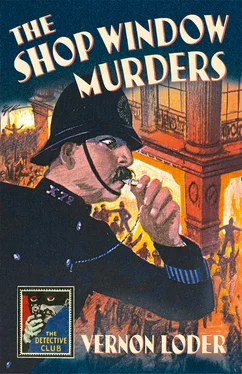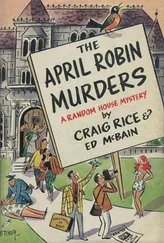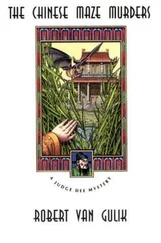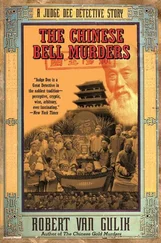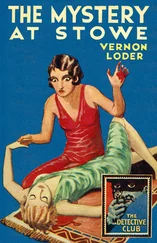‘The engine doesn’t work without any noise,’ said Webley impatiently. ‘Any fool would know that. You ask ’em.’
Devenish laughed. The man was apparently not at all servile, or frightened at this visit. ‘I see. Now can you tell me if it rained here yesterday?’
Webley stared. ‘It did. It rained hard for an hour or so—first we’ve had for some time.’
‘Is your taking-off place liable to get marshy and cut up with use after rain?’
Webley stared again. ‘Of course not. Mr Mander, he got money, and he wouldn’t leave it like a plough. Go out and look at it. The machine takes off in a very small bit, being what she is, and that bit is laid out like a hard tennis-court.’
‘Not hard clay?’
‘Clay, no. Cinders; fine and well rolled.’
Devenish began to see that his first thoughts might be the best guide. If the gyrocopter rose from a cinder ground it would not be likely to reach London with mud on the wheels—unless it had had a forced descent on the way.
‘May I see the machine? I have to make sure,’ he asked.
Webley laughed. ‘Come along. It’s your business, not mine.’
They left the cottage, and Webley opened the hangar with a key he kept in his pocket, and switched on about half a dozen arc-lamps that made the interior of the building almost as light as day, and whitened the asphalt floor which was laid there. In the middle of the garage one of the famous ‘Mander Hoppers’ stood ready.
Devenish walked over and examined it carefully, while Webley lounged near the doorway, puffing disinterestedly at his cigarette. The aeroplane was as clean as a new pin all over, but that of course might merely mean that Webley had spent his day on it.
As Devenish was going to return to the man, he looked down and noticed that there were nine or ten cigarette stubs on the floor near the machine. He dropped his own half-finished cigarette, and contrived to pick two of the others up as he bent. One was a cheap packet-cigarette called ‘Twix’ and the other was a fine Turkish brand, of a flat shape. Out of the stubs on the floor at least six were of this brand.
Webley was apparently a quick smoker. He had finished the cigarette given to him, and lit one of his own from the stub of it as Devenish rejoined him. The packet which he replaced in his pocket was labelled: ‘ Twix —the cigarette that has a kick.’
‘Look here,’ said the detective, his eyes fixed on the man’s face, ‘I believe Mr Mander was here after all. I see a lot of Turkish cigarette ends on the floor.’
‘He only smokes Russian,’ said Webley, spitting on the floor with an air of contempt. ‘What else?’
‘I should like to know who else was here then?’
‘Expect you would. It isn’t your business though.’
‘Now, Webley, you needn’t be hostile. That is silly. I have come here just to investigate Mr Mander’s death.’
‘And that’s silly, for Mr Mander wasn’t here yesterday, and them cigs aren’t anything to do with him.’
Devenish reflected. Anyone who put mud on spare wheels to suggest that the gyrocopter might have been flown from Gelover must have known that it had rained at Gelover. On the other hand, if that were so, he must be a man who was not aware that the taking-off place there was covered with hard-rolled cinders.
‘At any rate you had a visitor?’ he said.
‘That’s right,’ said Webley. ‘I had a visitor—a pal you may say, or you mayn’t—just as you like. I don’t make no mystery of it. If you’d asked me I would have told you.’
Devenish forced a laugh: ‘Yes, I brought it on myself. But now, if I ask you nicely, I don’t suppose you will object to telling me who your visitor was?’
Webley considered that for a few moments. ‘It was Mr Cane, if you want to know, that’s all. He’s in charge of the planes at the Store, he tells me.’
Devenish concealed his satisfaction. ‘I suppose he didn’t have a trip on the machine? No, I remember you said no one had. May I ask the nature of the errand he had here?’
‘Just came down for more details, that’s all. He said the guv’nor was complaining that the machines cost more to build and advertise than they were worth; to make a profit anyway. The guv’nor told me that before, so it was no news.’
‘Why, it seems to me, from all I hear, to have been a wonderful invention,’ said Devenish. ‘The find of the century.’
Webley’s eyes lighted up, and his surly expression faded. Some inner enthusiasm seemed to be eating him up as he replied that it was the best thing flown. He moved over to the machine as he spoke, and began eagerly to explain its points in technical language that passed for the most part over Devenish’s head. The change in the man from a surly and rather unintelligent boor to a clever and keen technician was really remarkable, and struck the detective, who listened for a quarter of an hour in silence. Then the man stopped, scratched his head, and instantly relapsed into the dull, morose being he had been before a mention of the gyrocopter struck a spark in his brain.
‘When did Mr Cane come here yesterday?’ the detective asked.
‘About six o’clock, sir. He caught the seven train.’
‘Had he ever been here before?’
‘No; I never saw him before. He came straight to this place, and went direct from it.’
‘He did not ask you about the landing ground, or look at it, eh?’
‘It was dark when he came. He didn’t ask.’
Devenish thanked him, and went away to the manor. There he was admitted by an elderly butler, a man Mander had enticed from Lord Valley’s service, and was assured that Webley was right. Mr Mander had not been there on the Sunday.
The butler had heard of the murder. Mr Kephim had rung him up (at this news the detective frowned). Mr Mander had been a generous master, and all the staff were greatly worried about the tragedy. Mr Kephim had said he would come down to settle what should be done about closing the Manor, but they had heard nothing since.
Devenish heard in addition that Mr Mander had not stayed a night in the house for the last month.
‘Did any of you hear the aeroplane go up on Sunday?’ he asked. The butler shook his head.
‘We’d have heard it if it had.’
Devenish nodded. ‘Right. Now, may I ask if Mr Mander has made any friends down here?’
‘Not yet, sir. The county people are, as you may say, stand-off,’ replied the man. ‘More than in most places I should say.’
‘So Mr Mander did not entertain?’
‘Not here, sir, though he may have done so in his flat in town.’
‘He never brought anyone here from town then?’
‘Not to stay, sir. None at all, unless you count the young lady came here with him once about five weeks ago.’
Devenish started. ‘Was she anything like this?’ he asked, and described the dead woman as well as he could.
The butler bit his lip. He was obviously wondering if he ought to disclose anything about his master’s guests. ‘That might not be unlike the lady, sir. Of course I did not look at her closely.’
‘Did she lunch or dine here?’
‘No, sir. She just came down in the car he keeps in town. He was in the car too. He showed her the gardens, and the house a little, and then drove off again.’
‘Did he say where?’
‘No, sir. He never told me.’
‘I can get that from his driver in town,’ Devenish said to himself, as he left the house, and started for the station.
CHAPTER VI Contents Cover Title Page Copyright Introduction Chapter I Chapter II Chapter III Chapter IV Chapter V Chapter VI Chapter VII Chapter VIII Chapter IX Chapter X Chapter XI Chapter XII Chapter XIII Chapter XIV Chapter XV Chapter XVI Chapter XVII Chapter XVIII Chapter XIX Chapter XX Chapter XXI Chapter XXII Chapter XXIII Chapter XXIV Chapter XXV Chapter XXVI Chapter XXVII Keep Reading … Конец ознакомительного фрагмента. Текст предоставлен ООО «ЛитРес». Прочитайте эту книгу целиком, купив полную легальную версию на ЛитРес. Безопасно оплатить книгу можно банковской картой Visa, MasterCard, Maestro, со счета мобильного телефона, с платежного терминала, в салоне МТС или Связной, через PayPal, WebMoney, Яндекс.Деньги, QIWI Кошелек, бонусными картами или другим удобным Вам способом. The Detective Story Club About the Publisher
Читать дальше
